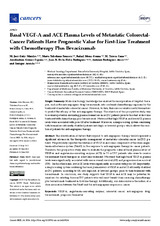Basal VEGF-A and ACE Plasma Levels of Metastatic Colorectal-Cancer Patients Have Prognostic Value for First-Line Treatment with Chemotherapy Plus Bevacizumab
Autor
Ortiz-Morales, M. José
Toledano-Fonseca, Marta
Mena-Osuna, Rafael
Cano, M. Teresa
Gómez-España, M. Auxiliadora
Haba-Rodríguez, Juan R. de la
Rodríguez-Ariza, Antonio
Aranda Aguilar, Enrique
Editor
MDPIFecha
2022Materia
VEGF-AAngiotensin-converting enzyme
Colorectal cancer
Anti-angiogenic drug
Bevacizumab
Prognosis
Biomarker
METS:
Mostrar el registro METSPREMIS:
Mostrar el registro PREMISMetadatos
Mostrar el registro completo del ítemResumen
The identification of factors that respond to anti-angiogenic therapy would represent a significant advance in the therapeutic management of metastatic-colorectal-cancer (mCRC) patients. We previously reported the relevance of VEGF-A and some components of the renin–angiotensin-aldosterone system (RAAS) in the response to anti-angiogenic therapy in cancer patients. Therefore, this prospective study aims to evaluate the prognostic value of basal plasma levels of VEGF-A and angiotensin-converting enzyme (ACE) in 73 mCRC patients who were to receive bevacizumab-based therapies as a first-line treatment. We found that high basal VEGF-A plasma levels were significantly associated with worse overall survival (OS) and progression-free survival (FPS). On the other hand, low ACE levels were significantly associated with poor OS. Importantly, a simple scoring system combining the basal plasma levels of VEGF-A and ACE efficiently stratified mCRC patients, according to OS, into high-risk or low-risk groups, prior to their treatment with bevacizumab. In conclusion, our study supports that VEGF-A and ACE may be potential biomarkers for selecting those mCRC patients who will most benefit from receiving chemotherapy plus bevacizumab treatment in first-line therapy. Additionally, our data reinforce the notion of a close association between the RAAS and the anti-angiogenic response in cancer.

